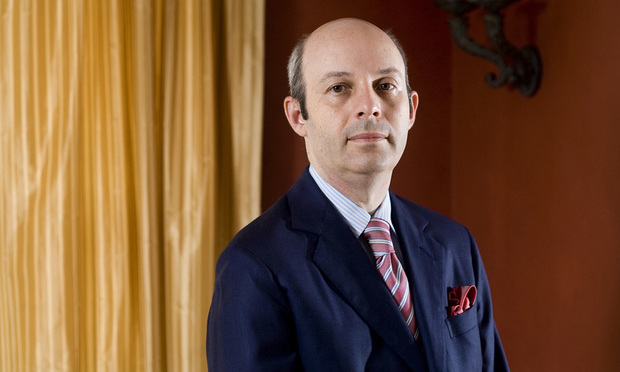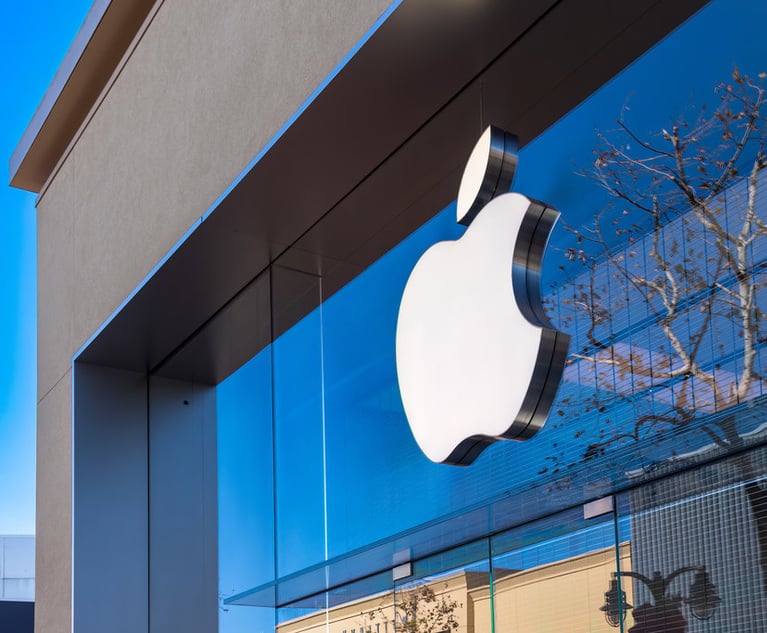Qualcomm Asks 9th Circuit to Stay Koh Injunction
The wireless giant adds Goldstein & Russell to its team while arguing that Koh wrongly found it had an antitrust duty to deal with its rivals. Meanwhile, the FTC has consented to Qualcomm's request to expedite briefing on the merits.
July 09, 2019 at 04:23 PM
4 minute read
 Thomas Goldstein. (Photo: Diego Radzinschi/ALM)
Thomas Goldstein. (Photo: Diego Radzinschi/ALM)Qualcomm is asking the U.S. Court of Appeals for the Ninth Circuit to stay U.S. District Judge Lucy Koh's antitrust injunction. The order, issued in May following a bench trial, would force Qualcomm to license rival chip suppliers on FRAND terms and renegotiate licenses with smartphone makers free from threats to disrupt their supply of modem chips.
Qualcomm has added Supreme Court advocate Thomas Goldstein of Goldstein & Russell to its all-star team, suggesting it anticipates the Ninth Circuit won't be the last stop for Federal Trade Commission v. Qualcomm.
If not stayed pending appeal, Koh's order will require “the nation's leading innovator of cellular technology to fundamentally change the way it has done business for decades—a period in which the industry has flourished, competition has increased, prices have declined, and innovation has accelerated,” states the motion, which is signed by Goldstein.
Though seeking an immediate stay, Qualcomm is also asking the Ninth Circuit to expedite its appeal on the merits, with briefing to be completed by October. The FTC is not opposing the request, which could mean a decision as early as next year.
Qualcomm's team at the Ninth Circuit also includes Cravath, Swaine & Moore; Keker, Van Nest & Peters; and Morgan, Lewis & Bockius.
Senior Judges Mary Schroeder and William Canby and Judge Morgan Christen are assigned to the Ninth Circuit motions panel for July.
Koh summarily denied a similar stay motion from Qualcomm last week. Her injunction also forbids Qualcomm from fashioning actual or de facto exclusive dealing agreements with companies such as Apple Inc., LG Electronics Inc. and Samsung Electronics Inc., and precludes Qualcomm from interfering with such companies' ability to communicate with government regulators. Qualcomm is not seeking an immediate stay of those provisions before the Ninth Circuit, though it says it will challenge them later in the appeal.
Instead, it argues that the first two prongs of Koh's order are based on legal errors and already causing irreparable harm to its relationships with the original equipment manufacturers (OEMs) who produce smartphones and other mobile devices. “One licensee now relies on the order to justify a preexisting breach of its current license agreement,” Qualcomm states in its motion. “At least one OEM has stated that Qualcomm must license a chip rival, in order to permit the OEM to buy the rival's chips with Qualcomm's patents exhausted, while seriously considering ceasing paying royalties to Qualcomm under its current agreement.”
The company asserts that the Justice Department's Antitrust Division chief, Makan Delrahim, has described the theory Koh relied on as a “misuse of the antitrust laws,” and that one of the five FTC commissioners has called her order “bad law and bad policy.”
In particular, Qualcomm and Goldstein focus on Koh's finding that Qualcomm had an antitrust duty to deal with rival chip manufacturers. “The Supreme Court has recognized the bedrock principle that a business—including a monopolist—is generally entitled to determine with whom it will do business and in what manner,” Goldstein writes. He also challenges Koh's determination that Qualcomm effectively imposes a “surcharge” on rivals' chips.
The company also argues that the injunction cuts against the public interest. “The Government has recognized that Qualcomm's technological leadership is vital to the 'national security of the United States,' which could be harmed as a result of a change to Qualcomm's business model,” Goldstein writes.
Before Koh, the Federal Trade Commission turned the public interest argument back on Qualcomm, arguing a stay would let it unfairly entrench its monopoly power during the critical rollout of 5G wireless technology over the next couple of years.
Qualcomm's “argument that anything that diminishes its corporate profits would necessarily threaten national security is absurdly overbroad and contrary to Congress's determination, in enacting the Sherman Act, that competition furthers the public interest,” the FTC had argued.
The agency said that Qualcomm's claims of irreparable harm “cannot be reconciled with its repeated representations during this litigation that chip leverage has no material impact on Qualcomm's licensing revenues.”
This content has been archived. It is available through our partners, LexisNexis® and Bloomberg Law.
To view this content, please continue to their sites.
Not a Lexis Subscriber?
Subscribe Now
Not a Bloomberg Law Subscriber?
Subscribe Now
NOT FOR REPRINT
© 2025 ALM Global, LLC, All Rights Reserved. Request academic re-use from www.copyright.com. All other uses, submit a request to [email protected]. For more information visit Asset & Logo Licensing.
You Might Like
View All
White & Case KOs Claims Against Voltage LLC in Solar Companies' Trade Dispute


'A Never-Ending Nightmare': Apple Sued for Alleged Failure to Protect Child Sexual Abuse Survivors

'The Hubris of Big Tech': Apple Hit With California Labor Lawsuit for Alleged Free Speech, Privacy Violations
Trending Stories
- 1NJ Supreme Court Clarifies Affidavit of Merit Requirement for Doctor With Dual Specialties
- 2Whether to Choose State or Federal Court in a Case Involving a Franchise?
- 3Am Law 200 Firms Announce Wave of D.C. Hires in White-Collar, Antitrust, Litigation Practices
- 4K&L Gates Files String of Suits Against Electronics Manufacturer's Competitors, Brightness Misrepresentations
- 5'Better of the Split': District Judge Weighs Circuit Divide in Considering Who Pays Decades-Old Medical Bill
Who Got The Work
J. Brugh Lower of Gibbons has entered an appearance for industrial equipment supplier Devco Corporation in a pending trademark infringement lawsuit. The suit, accusing the defendant of selling knock-off Graco products, was filed Dec. 18 in New Jersey District Court by Rivkin Radler on behalf of Graco Inc. and Graco Minnesota. The case, assigned to U.S. District Judge Zahid N. Quraishi, is 3:24-cv-11294, Graco Inc. et al v. Devco Corporation.
Who Got The Work
Rebecca Maller-Stein and Kent A. Yalowitz of Arnold & Porter Kaye Scholer have entered their appearances for Hanaco Venture Capital and its executives, Lior Prosor and David Frankel, in a pending securities lawsuit. The action, filed on Dec. 24 in New York Southern District Court by Zell, Aron & Co. on behalf of Goldeneye Advisors, accuses the defendants of negligently and fraudulently managing the plaintiff's $1 million investment. The case, assigned to U.S. District Judge Vernon S. Broderick, is 1:24-cv-09918, Goldeneye Advisors, LLC v. Hanaco Venture Capital, Ltd. et al.
Who Got The Work
Attorneys from A&O Shearman has stepped in as defense counsel for Toronto-Dominion Bank and other defendants in a pending securities class action. The suit, filed Dec. 11 in New York Southern District Court by Bleichmar Fonti & Auld, accuses the defendants of concealing the bank's 'pervasive' deficiencies in regards to its compliance with the Bank Secrecy Act and the quality of its anti-money laundering controls. The case, assigned to U.S. District Judge Arun Subramanian, is 1:24-cv-09445, Gonzalez v. The Toronto-Dominion Bank et al.
Who Got The Work
Crown Castle International, a Pennsylvania company providing shared communications infrastructure, has turned to Luke D. Wolf of Gordon Rees Scully Mansukhani to fend off a pending breach-of-contract lawsuit. The court action, filed Nov. 25 in Michigan Eastern District Court by Hooper Hathaway PC on behalf of The Town Residences LLC, accuses Crown Castle of failing to transfer approximately $30,000 in utility payments from T-Mobile in breach of a roof-top lease and assignment agreement. The case, assigned to U.S. District Judge Susan K. Declercq, is 2:24-cv-13131, The Town Residences LLC v. T-Mobile US, Inc. et al.
Who Got The Work
Wilfred P. Coronato and Daniel M. Schwartz of McCarter & English have stepped in as defense counsel to Electrolux Home Products Inc. in a pending product liability lawsuit. The court action, filed Nov. 26 in New York Eastern District Court by Poulos Lopiccolo PC and Nagel Rice LLP on behalf of David Stern, alleges that the defendant's refrigerators’ drawers and shelving repeatedly break and fall apart within months after purchase. The case, assigned to U.S. District Judge Joan M. Azrack, is 2:24-cv-08204, Stern v. Electrolux Home Products, Inc.
Featured Firms
Law Offices of Gary Martin Hays & Associates, P.C.
(470) 294-1674
Law Offices of Mark E. Salomone
(857) 444-6468
Smith & Hassler
(713) 739-1250






